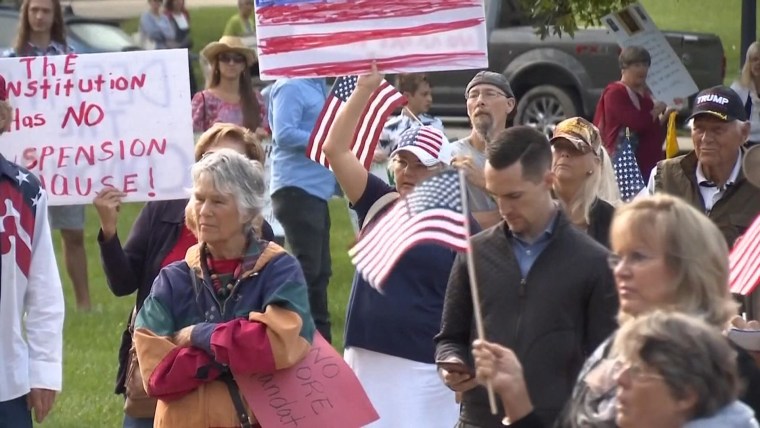In the early weeks of the pandemic, before coronavirus cases crushed hospitals in New York and spiked in other states, Dr. Rebecca Shadowen asked her friends a question on Facebook.
“If you could save the life of another person without harming your own, would you?” Shadowen, an infectious disease specialist in Kentucky, posted on March 13.
From the start, the doctor advocated for social distancing, hand-washing and mask-wearing, and she hoped her community of Bowling Green could become a model for the rest of her state, where residents sparred over stay-at-home orders and challenged Kentucky’s mask mandate in the courts.
In May, while offering her expertise as a member of the Bowling Green-Warren County Coronavirus Workgroup, Shadowen fell ill. At first, she complained of feeling tired, but on the night she was taken to the hospital, she woke up saying she was short of breath, her husband, David, said.
She toggled between local hospitals for the next four months, at times being placed on a ventilator and in the intensive care unit. During weeks she regained her strength, she was lucid enough to continue working from her hospital bed and sharing what she knew about a virus that was ravaging her body in unexpected ways.
“There were multiple times she thought she was turning the corner and we thought she was on the road to recovery,” David Shadowen, who is also a doctor, said.
But after dealing with complications from the virus, including abdominal bleeding and weakened lungs, Shadowen died on Sept. 11 surrounded by her husband and two adult children. She was 62.
Download the NBC News app for full coverage of the coronavirus outbreak
David and Rebecca Shadowen were college sweethearts at Western Kentucky University, and together they enrolled at the University of Louisville School of Medicine. Shadowen went on to specialize in infectious diseases, including HIV/AIDS and Lyme disease, and, this year, Covid-19.
She worked out of the Medical Center at Bowling Green, where colleagues leaned on her more than three decades of medical knowledge and she enjoyed helping medical students and residents.
Even after she became sick, she continued on the county’s coronavirus workgroup, urging the need for a local mask ordinance. When she learned something especially important, she would send out a group text, sometimes in the middle of the night. She believed the simple act of wearing a mask could stop the spread of the disease.
“She’d say, ‘Look folks, this isn’t politics. This is science,'” said Dennis Chaney, the Medical Center’s vice president of ancillary services. “I heard her say that many times.”
After her death, Kentucky Gov. Andy Beshear tweeted his praise of Shadowen as being a “front line hero.”
David Shadowen believes his wife contracted Covid-19 the way he and their daughter, Kathryn, did: from a home health aide who had infected his elderly mother.
But the Shadowens’ son, Jesse, did not test positive for the virus. David Shadowen said he and his daughter had mild symptoms from Covid-19, which made Shadowen’s debilitating struggle all the more frustrating.
Before she got sick, Shadowen went to her church, empty during the pandemic, and prayed in a pew. She was conflicted, wrestling with all the risks and her responsibilities as a health care worker, said Adam Shourds, senior pastor at Broadway United Methodist Church.
“She said, ‘We all have a responsibility,'” Shourds recalled. “‘My role is important, but it’s no more important than anyone else’s.'”
He said Shadowen texted him the day she was scheduled to be placed on a ventilator: “I’m going on the vent today. This is not the end.”
She wasn’t bitter, she said, and used her last few months to understand everything she could about the coronavirus.
“She fought the virus harder than anybody because she knew how,” Shourds said.
During Shadowen’s visitation and funeral service this week, former patients and family members of patients approached David Shadowen and his children.
Many told them the same thing: “‘I’m alive today because she saved my life,’ or ‘She saved my mother’s life,'” David Shadowen said.
He described her as the glue that held their household together, working long shifts, taking care of the finances, making meals and shuttling the kids between soccer practice and ballet, all without breaking a sweat.
She embodied so much, David Shadowen said: a person of faith, a mother, a wife and a doctor.
Their daughter, Kathryn, 23, said there were countless times when they were out in public that someone would stop her mother to thank her for what she did.
“It was really powerful to be the kid of someone who saved people,” she said. “A lot of kids think of their parents as heroes. Mine actually was.”
